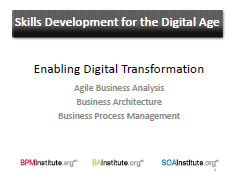Gartner introduced the concept of Hyperautomation in 2019 as the key trend for 2020. What is it? Well, it’s simply the combination of different technologies to carry out the end-to-end automation of an organization’s processes by integrating technologies such as robotic process automation (RPA), intelligent business process management (IBPM), machine learning, and artificial intelligence (AI).
January 5, 2005

Andrew Spanyi
Business Process Management (BPM)
Digital Transformation (DX)
Analytics/Big Data
Customer Experience
Operational Excellence (OPEX)
Organizational Change Management (OCM)
Articles by: Andrew Spanyi
Taking Best Advantage of Process Mining
An increasing numbers of companies are becoming keenly interested in process mining. For example, the main track of the recent “International Conference on Process Mining (ICPM 2020)” had almost 2000 registered participants. While it was a virtual event due to Covid 19 – that level of participation is impressive nevertheless.
Why the rapidly growing interest in process mining? Unlike process modeling workshops, where the model is largely based on people’s perception of how work is done, process mining is data based. It extracts insights from processes by the means of analyzing the event data generated in IT systems. The potential benefits of process mining are principally related to process discovery and conformance checking. In other words, process mining compares data from the event log step-by-step with the process documentation or model to find discrepancies.
BPM Resurgence
Business process management (BPM) has been quietly undergoing resurgence as organizations gradually recognize the central role of process in digital transformation.
Ramping Up Skills for Digital
EDITOR’S NOTE: DBizInstitute.org has released it first research report “Digital Business Adoption: Examining the drivers for digital business success around the world”. Access this members-only report by logging in (existing members) or join DBizInstitute.org today.
Accelerate Digital Transformation with Process Management
EDITORS NOTE: DBizInstitute.org is conducting a Digital Business Adoption survey. Please take a few moments to answer the survey and contribute to this important research.
BPM Maturity is Needed for Digital Business Success
BPM Maturity is Needed for Digital Business Success
The importance of a process orientation in driving digital business success has been recognized for some time. In the early days of digital – it was already recognized that leading companies succeed with digital by re-envisioning customer experience, operational processes and business models.
Gartner has also stressed the importance of BPM in digital transformation success and predicted that a deficit of BPM maturity may actually prevent 80 percent of organizations from achieving the desired business outcomes from their digitalbusiness strategies.
The main options for deploying digital are:
a) Find a digital tool and deploy it
Essential Skills for Digital Business Leaders
A successful digital business initiative relies upon adopting agile principles, an enduring focus on improving customer experience and executing programs with a business process based view with enabling digital information technology.
Measuring what matters to customers and challenging the current operating model of the business are two important characteristics of digitally mature organizations.
Join Gregg Rock and our leading digital business experts as they discuss the critical skills needed in your digital transformation initiatives:
- Introduction to Digital Business
- by Andrew Spanyi
- Design Thinking Applied
- by Clay Richardson
- Robotic Process Automation
- by Cornelius Pone
- Digital Customer Experience
- by Andrew Spanyi
5 Questions to Assess Digital Transformation at the Enterprise Level
Digital transformation is still one of the business buzzwords of the year. It is estimated that 89% of organizations have digital transformation as a business priority. But if you feel like you’ve come to a standstill in your digital transformation efforts, you are not alone. As many as 84% of digital transformation efforts fail to achieve desired results. And that statistic would likely be higher if we examined only the larger, enterprise level efforts. What exactly is digital transformation? According to researchers at MIT Sloan, digital transformation occurs when businesses are focused on integrating digital technologies, such as social, mobile, analytics and cloud, in the service of transforming how their businesses work. The preoccupation with digital transformation makes sense given the pace of change. Richard Foster, at the Yale School of Management, found that the average lifespan of an S&P company dropped from 67 years in the 1920s to 15 years today.
Four of the Top Reasons for Operational Excellence Failure
Given that operational excellence (Op Ex) was built on a solid foundation of total quality management principles, it’s a bit surprising that as many as two thirds of Op Ex programs fail to meet expectations. While there are many reasons accounting for the failure of enterprise wide Op Ex programs, the following are arguably the top four in my experience.
Lack of Purpose
Career Options for Business Analysts and Project Managers
We live in times where the only constant is change. Efforts to shift to Digital Business and transformations are underway everywhere. It’s no wonder that many of our members, especially analysts and project/portfolio managers, are trying to figure out where they’ll go next in their careers and what types of skills they’ll need to have continued success.
This webcast brings together three preeminent subject matter experts to provide you with insight into three disciplines that we believe have staying power and are potentially a good fit for you and your career.
For each topic, we discuss:























